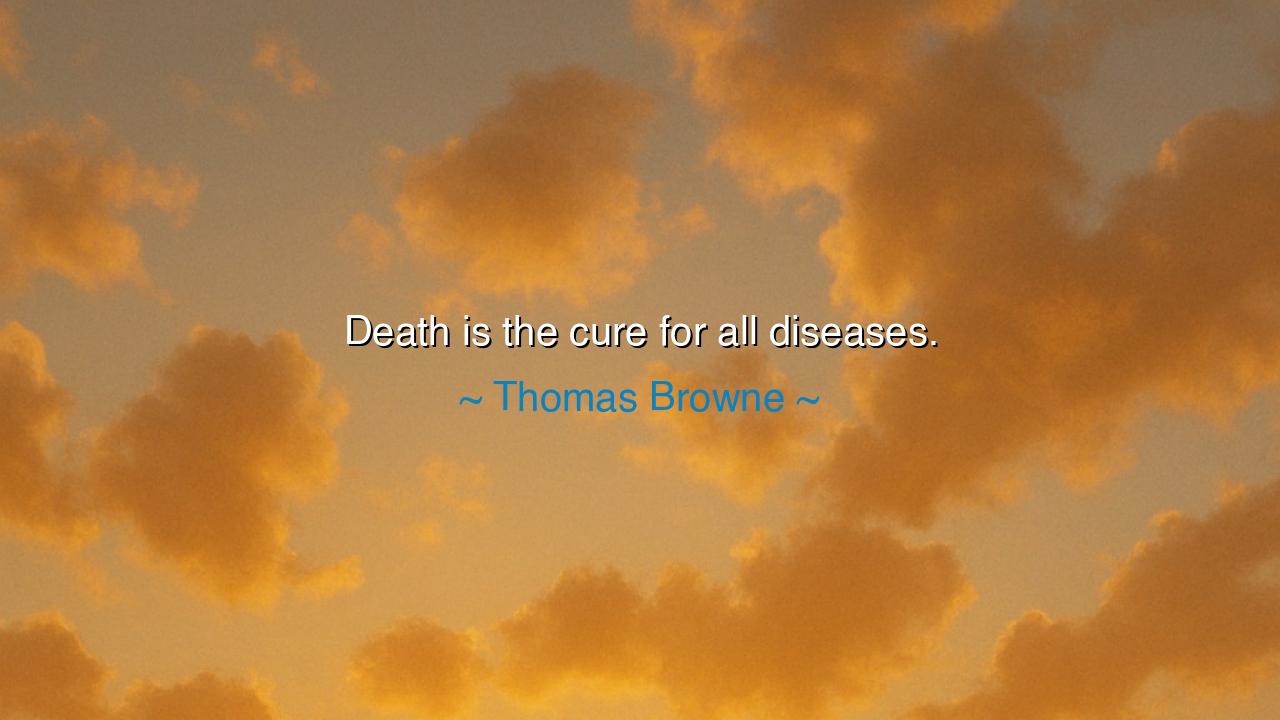
Death is the cure for all diseases.






“Death is the cure for all diseases.” Thus spoke Sir Thomas Browne, physician, philosopher, and man of faith, whose pen turned the mysteries of life and death into sacred contemplation. In these few words, he expressed a truth that is both terrifying and consoling: that death, which mankind fears above all else, is not merely an end, but a remedy—a divine and ultimate healing. For in death, all pain ceases, all struggle ends, and the weary flesh, long burdened by the frailties of life, finds its final rest. Browne did not utter this phrase in bitterness, but in reverence. To him, death was not a punishment but a release, the final act of mercy written into the design of existence.
Thomas Browne lived in the seventeenth century, a time of plagues, wars, and the ceaseless uncertainty of life. As a physician, he had seen the suffering of bodies ravaged by disease; as a Christian mystic, he pondered the soul’s immortality beyond that suffering. His quote—“Death is the cure for all diseases”—springs from both these callings. It is the reflection of a man who healed the body but also tended to the spirit. He saw that while medicine could mend the flesh for a time, death itself was the great physician of the soul, restoring it to wholeness in eternity. Where medicine fails, death completes the work—returning man from corruption to peace, from pain to silence, from mortality to the infinite.
The ancients, too, understood this sacred paradox. The Stoics taught that death is part of nature’s law and therefore not to be feared, for it brings release from the turmoil of existence. Socrates, when condemned to drink the hemlock, told his disciples that death might be the greatest blessing of all—for who can say what dreams may come when the soul is freed from its cage? And in Christian theology, death is not annihilation but transformation: a passage into the eternal life promised by faith. Browne, who stood at the intersection of science and spirituality, saw death as the one universal medicine—the only cure that works without fail, for it heals not the body but the whole being.
Consider the story of Mother Teresa, who spent her life tending to the dying in the streets of Calcutta. She did not see death as defeat, but as completion. To her, every dying person was not perishing, but crossing a threshold into peace. She cleaned their wounds, comforted their souls, and spoke softly of God’s embrace. She understood, as Browne did, that death is the final balm for suffering—a return to the divine source where pain can no longer reach. For in the eyes of those who believe, death does not destroy life; it transfigures it.
The meaning of Browne’s words, however, is not only theological—it is deeply philosophical. He reminds us that all things in the world are temporary, and that our struggles, no matter how consuming, will one day dissolve into stillness. This truth, though solemn, offers liberation. For when one accepts that even the deepest agony will pass, one learns to face suffering with calm. Death, then, is not merely an end, but a promise—a reminder that nothing lasts forever, neither joy nor grief, neither strength nor sickness. To live with this understanding is to live wisely and peacefully, embracing each day without clinging to it.
And yet, Browne’s insight carries a warning as well. To see death as the cure for all diseases is not to seek it, but to accept it. The lesson is not to abandon life, but to face it with serenity. The man who fears death lives as a prisoner; the one who accepts it walks freely. For if death is the inevitable cure, then life is the sacred opportunity—to love, to learn, to create, and to prepare the soul for that healing sleep. Browne teaches us that the way to meet death without terror is to live without regret, to make of our brief time a thing of beauty and meaning, so that when the final cure arrives, we greet it not as an enemy, but as a friend long awaited.
The lesson, then, is clear: live with the knowledge of death, but not in the shadow of fear. Let it remind you that every moment is precious, every kindness eternal, every act of love a defiance of decay. When you see suffering—your own or another’s—remember that all pain is passing. When you confront the loss of those you love, know that death has not undone them, but restored them to peace. And when your own hour comes, may you walk toward it with the calm of Thomas Browne himself, saying, “At last, the great physician has come.”
So, my listener, remember these words: “Death is the cure for all diseases.” Do not hear in them despair, but divine order. For just as the sunset is not the death of the sun but its descent into another world, so too is death the soul’s journey into healing beyond time. Embrace life, cherish it fiercely—but when the hour of departure arrives, release it with grace. For in that final letting go, all wounds are closed, all sorrows cease, and the spirit at last is whole.






AAdministratorAdministrator
Welcome, honored guests. Please leave a comment, we will respond soon